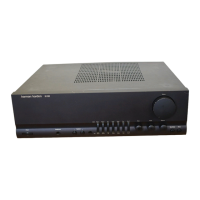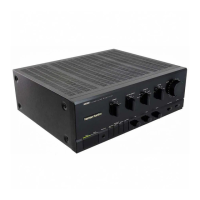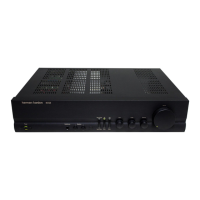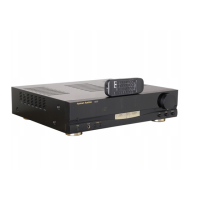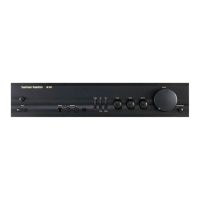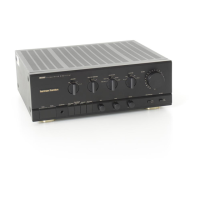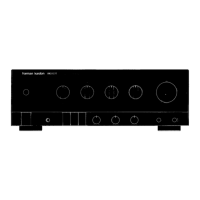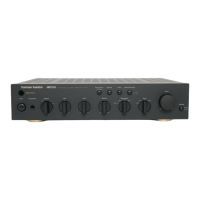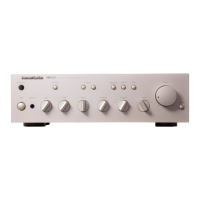Do you have a question about the Harman Kardon HK6850 and is the answer not in the manual?
Uses separate electronic components for improved linearity and reduced distortion.
Provides high instantaneous current for dynamic music signals and demanding speaker loads.
Reproduces frequencies from <10Hz to >100kHz for accurate transient response and phase linearity.
Employs low negative feedback for stable amplification, unmeasurable TIM distortion, and outstanding imaging.
Bypasses tone controls and preamplifier circuitry for purer sound quality via volume control.
Bypasses tone control circuitry for unaltered, accurate musical reproduction.
Utilizes high-fidelity electronic analog switches for quiet, reliable input/output connection switching.
Handles low impedances and unstable speaker loads, adjustable for higher voltage into higher impedances.
Special equalization compensates for ear's decreased sensitivity at low volumes, correcting midrange phase errors.
Matches gain/impedance to turntable cartridge type (MM or MC) for optimal phono playback.
Crucial warnings regarding electric shock, fire risk, and proper plug insertion.
Guidelines for positioning the amplifier for proper ventilation and away from heat/sunlight.
Specifies connection to a 120 volt, 60 cycle power supply only.
Advice on routing the power cord to prevent damage and stress points.
Instructions to use a clean dry cloth, avoiding solvents and dust accumulation.
Warning against operating the amplifier near water or in wet environments.
Procedure for immediate action if an abnormal smell or smoke is detected.
Conditions requiring authorized service personnel and advice against user servicing.
Recommendation to save original box and packing material for future transport or shipping.
Importance of filling out the warranty card and saving the sales receipt for proof of purchase.
Button to turn the unit on/off; remote control function when "On".
LED indicator showing power status (green) and standby mode (amber for HK6950R).
Indicates protection circuitry is engaged due to overheating or short circuits.
Standard 1/4" jack for connecting stereo headphones, allowing listening without speakers.
Boosts low frequencies at low volumes to compensate for reduced ear sensitivity.
Filters out sub-audible frequencies from warped records or resonance to protect speakers and improve sound.
Bypasses bass and treble controls for unaltered frequency response.
Adjusts low frequencies (below 300Hz) up to ±10dB to shape system sound.
Adjusts high frequencies (above 3000Hz) up to ±10dB to shape system sound.
Distributes sound between left and right speakers for equal balance.
Bypasses tone controls and preamplifier circuitry for direct signal to volume control.
Sets gain/impedance for MM or MC phono cartridges to match turntable type.
Adjusts the overall sound level; recommended to turn down before powering on/changing source.
Selects the input program source (PHONO, TUNER, CD, VIDEO, AUX).
Selects program source to record on tape decks (TUNER, SOURCE, COPY 1-2, COPY 2-1).
Selects tape deck for listening (TAPE 1, SOURCE, TAPE 2), used for monitoring during recording.
Controls which speaker set(s) (OFF, 1, 2, 1+2) are active for listening.
General advice on connecting components, including cable management and polarity.
Details on switched and unswitched AC outlets and their power ratings.
Guidance on speaker wire gauge, connection polarity, and setting speaker operating modes.
Instructions on setting switches for speaker impedance (4 or 8 ohm) for optimal amplifier operation.
Guidance on connecting MM and MC cartridges, ground wire, and using shorting pins.
Instructions for connecting a CD player to the CD input jacks.
Instructions for connecting a tuner and ensuring proper antenna connection.
Guidance on connecting tape decks to TAPE 1/2 jacks or AUX connectors.
Instructions for connecting audio out from video products to the amplifier.
Using PRE-OUT connectors to connect the HK6850/HK6950R to an external power amplifier.
Using Main-in jacks to connect an external preamplifier to the HK6850/HK6950R.
Connecting an external remote sensor or compatible components for remote operation.
Steps for playing a record, including source selection and subsonic filter use.
Steps for selecting and listening to CD, tuner, AUX, or video sources.
Instructions for playing tapes from connected tape decks using the TAPE MONITOR selector.
Guidance on recording from various sources, including monitoring and using multiple decks.
Steps for copying tapes between decks, including direction, monitoring, and source selection.
Information on using the system remote control for amplifier functions and compatible components.
Details on remote control range, angle, environmental factors, and battery usage.
Checks for power cord, outlet, or breaker issues preventing front panel illumination.
Troubleshooting steps for overheating, short circuits, or internal protection issues.
Checks for incorrect speaker connections, selector settings, short circuits, or source selection.
Troubleshooting steps for tape deck sound issues, including selector and connection checks.
Checks for incorrect turntable input jacks (MM/MC) and cartridge type.
Troubleshooting steps for turntable hum, focusing on ground wire connection and cable placement.
Steps to resolve turntable howling, including bass boost, loudness, and placement checks.
Diagnosis for lack of bass, primarily checking speaker wire polarity.
Checks for tuner antenna connection and proper positioning for signal quality.
Checks if TONE DEFEAT or PREAMPLIFIER BYPASS switches are engaged.
| Total Harmonic Distortion | 0.08% |
|---|---|
| Type | Integrated Amplifier |
| Damping Factor | 100 |
| Channel Separation | 60dB (line) |
| Input Impedance | 47kΩ |
| Input Sensitivity | 150mV (line) |
